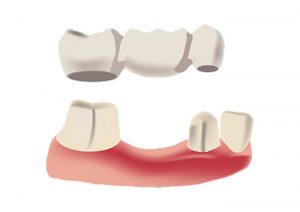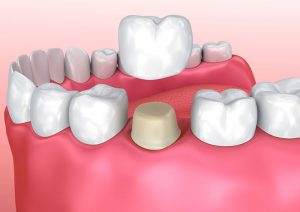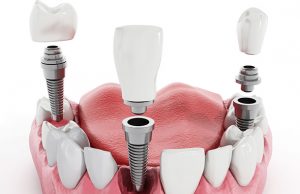Restorative Dentistry in Regina
Restorative dentistry services offered by your Regina dentist.
Fillings are the most common procedure performed at most dental offices. Lack of proper oral hygiene often leads to decay (cavities). Dental fillings are used to repair the damage created by decay. Fillings restore form and function to the tooth, however, in cases of larger decay or fractures, crowns may be more suited.
We provide a large number of treatment options including fillings, cleanings, root canals, dental implants, crowns, and bridges. Our goal is to meet your dental needs and offer you an enjoyable visit.
Keep reading below for short descriptions of our restorative dentistry services.
Come meet your local Regina Dentist
You deserve a happy dental experience, we want to help. Call us today at (306) 584-8115 for our assistance.
Fillings
To treat a cavity we remove the decayed portion of the tooth and then “fill” the area on the tooth where the decayed material once lived. Fillings are also used to repair cracked or broken teeth and teeth that have been worn down from misuse (such as from nail-biting or tooth grinding).
Today, several dental filling materials are available. Teeth can be filled with gold; porcelain; or more commonly, tooth-coloured, plastic and glass materials called composite resin fillings. The location and extent of the decay, cost of filling material, patients’ insurance coverage and our dentist’s recommendation assist in determining the type of filling that will best address your needs.
Root Canals
Extensive decay, tooth trauma, or gum disease can infect the nerve of a tooth causing inflammation or infection that can lead to pain and a dental abscess. During a root canal procedure, the affected nerve and pulp are removed and the inside of the tooth is cleaned and sealed.
A successful root canal treatment lets you keep the tooth rather than having to pull it out. Keeping your tooth helps to prevent your other teeth from drifting out of line and causing jaw problems. It also avoids having to replace it with an artificial tooth. With today’s modern dental techniques, having root canals done by a dentist is no longer a scary experience. Our team is experienced in performing root canal therapy.

Inlays and Onlays
Inlays and onlays restore your teeth beautifully with custom-created porcelain or resin material. They are an aesthetic alternative to fillings and look exactly like the rest of your natural tooth. Inlays and onlays protect and restore large portions of the decayed tooth, much like a large filling.
Inlays fill the tooth in between cusps, while onlays lay over the chewing surface of your tooth. We often recommend inlays and onlays because they are one of the highest quality options available. They preserve tooth structure, and are more durable than some of our other choices.
The procedure:
Restoring your teeth with inlays or onlays take two appointments. On your first visit, we carefully prepare your teeth, then take an impression and send it to a dental laboratory. There, a model of your teeth is made and used to create your inlay or onlay from porcelain, gold or resins.
On your next visit, the inlay or onlay is placed in your teeth, and are adjusted for a precise fit. Once that is achieved, we cement it, polish and check it one more time for the accuracy of your bite. Then the appearance and function of your teeth will be restored!
Bridges
A bridge is a dental appliance that replaces one or more natural missing teeth, thereby “bridging” the space between two teeth. Fixed bridges are cemented into place next to the “abutment” teeth – the surrounding teeth on either side of the space.
 Unlike removable partial dentures, fixed bridges cannot be taken out of the mouth by the patient. A fixed bridge is a device that typically consists of three units–a pontic (a false tooth) fused between two crowns that are cemented into the abutment teeth.
Unlike removable partial dentures, fixed bridges cannot be taken out of the mouth by the patient. A fixed bridge is a device that typically consists of three units–a pontic (a false tooth) fused between two crowns that are cemented into the abutment teeth.
If you are missing any teeth and are committed to maintain good oral hygiene practice, you may be a good candidate for a bridge. A bridge is the most natural choice to fill the space in you mouth left by missing teeth.
If left unfilled, this space can cause the surrounding teeth to drift out of position and can cause teeth and gums to become more susceptible to tooth decay and gum disease that can cause further tooth loss. Fixed bridges not only correct an altered bite, improve you chewing ability and speech, but they also safeguard you appearance by preventing the collapse of you facial texture that can cause premature wrinkles and age lines.
Crowns
A crown is a restoration that covers, or “caps’, a tooth to restore it to its normal shape and size, strengthening and improving the appearance of a tooth. Crowns are necessary when a tooth is broken down and fillings won’t solve the problem. If a tooth is cracked, a crown holds the tooth together to seal the cracks so the damage will not get worse. Crowns are also used to support a large filling when there is not enough of the tooth remaining, to protect weak teeth from fracturing, to restore fractured teeth, or to cover badly shaped or discolored teeth.
How is a crown placed?
 To prepare the tooth for a crown, it is reduced so the crown can fit over it. An impression of teeth and gums is made and sent to the lab for crown fabrication. A temporary crown is fitted over the tooth until the permanent crown is made. On the next visit, the dentist removes the temporary crown and cements the permanent crown onto the tooth.
To prepare the tooth for a crown, it is reduced so the crown can fit over it. An impression of teeth and gums is made and sent to the lab for crown fabrication. A temporary crown is fitted over the tooth until the permanent crown is made. On the next visit, the dentist removes the temporary crown and cements the permanent crown onto the tooth.
Will it look natural?
Yes. The dentist’s main goal is to create crowns that look like natural teeth. That is why dentists take an impression. To achieve a certain look, a number of factors are considered, such as the color, bite, shape and the length of your natural teeth. Any one of these factors alone can affect you appearance.
An Ounce of Prevention Is Still the Rule!
Once your crown is in place, make sure the area is brushed well and that you floss below the gum line. While the crown protects your remaining tooth from further decay, you must protect the base of the crown from bacterial growth and gum disease. Regular brushing and flossing as you would your natural teeth will ensure that your crown will be in place for years to come!
Dental Implants
A dental implant is a small man-made titanium screw that serves as the replacement for the root portion of a missing natural tooth. The implant is placed in the bone of the upper or lower jaw and allowed to bond with the bone and serve as an anchor for the replacement tooth. Dental implants can be used to replace a single lost tooth or many missing teeth. Implant-supported replacement teeth look, feel and function like natural teeth. Dental implants are a proven restorative option with a long clinical history. Dental implants preserve the integrity of the facial structure and reduce the inconvenience associated with tooth loss.
 Anyone who is missing one or more of their teeth due to injury, disease or decay may be a candidate for dental implants, and numerous clinics throughout Greater Vancouver are able to provide this procedure. If one, a few or all teeth are missing, dental implants in conjunction with a crown or bridge can replace those teeth. Occasionally, older patient express concern that their age may prevent them from enjoying the benefits that dental implant offer. However, health is more of a deterring factor than age. If you are healthy enough to have a tooth extracted, you are probably healthy enough to receive dental implants. Your dentist will determine if you are a candidate for dental implants after a careful evaluation of your dental and medical history. At this time all you questions can be answered.
Anyone who is missing one or more of their teeth due to injury, disease or decay may be a candidate for dental implants, and numerous clinics throughout Greater Vancouver are able to provide this procedure. If one, a few or all teeth are missing, dental implants in conjunction with a crown or bridge can replace those teeth. Occasionally, older patient express concern that their age may prevent them from enjoying the benefits that dental implant offer. However, health is more of a deterring factor than age. If you are healthy enough to have a tooth extracted, you are probably healthy enough to receive dental implants. Your dentist will determine if you are a candidate for dental implants after a careful evaluation of your dental and medical history. At this time all you questions can be answered.
Is there any pain or discomfort involved?
Most patients report that there is a very little discomfort and that they were much more comfortable following the procedure than they anticipated. Implants are placed in a very gentle fashion and care is taken to the various tissues involved. Anesthesia and patient sedation are used to eliminate any discomfort during the procedure. Your dentist may recommend that you speak with another patient who has already had tooth replacement therapy to assess their personal experience.
How will I benefit from dental implants?
The benefits of implant treatment include appearance, the enhanced ability to chew and enjoy your food and often protection of you remaining teeth and jawbone. Dental implants offer many benefits never before available for the treatment of missing teeth. In short, dental implants will look, feel and function like your real teeth.
How long will the treatment take?
Treatment time will vary depending on your particular situation. Nowadays it is often possible to get well-functioning and aesthetically stunning teeth within a few days, whether you’re in Vancouver, Delta, Abbotsford, or elsewhere. In some cases it may be necessary to wait longer before finishing the restoration in order to obtain an optimal result.
Will I ever be without my teeth?
This depends on your situation. Most patients can leave the office wearing some type of temporary prosthesis.
How much will it cost?
The fee for tooth replacement with dental implants will depend on several factors, including the number of teeth being replaced and the number of implants required to support your replacement teeth. It is important for you to know that you do not necessarily need an implant for each missing root. Some additional procedures may be required prior to the placement of your implants to ensure the long-term health of your dental implants. To obtain a specific fee estimate, it is necessary to have a doctor examine your mouth. After a diagnostic examination, your dentist will recommend the treatment that is best for you and what your investment would be for the procedure.
How long do implants last?
Most patients can expect them to last for a lifetime. The first patient received his dental implants in 1965 and they remained functioning until his passing in 2006 – more than 40 years. In and around Greater Vancouver, dentists have been inserting dental implants for decades.
How do implants compare to normal dentures?
Dental implants provide an improvement in the quality of life that dentures can’t provide. A survey was conducted of patients who had their teeth extracted and fitted with dentures, then eventually had their dentures replaced with implants. While they rated their natural teeth highest at 10, dentures rated lowest at 2 and implants were rated 9. Your friends won’t know you have implants but more than likely, you will tell everyone.
Come meet your local Regina Dentist
You deserve a happy dental experience, we want to help. Call us today at (306) 584-8115 for our assistance.
